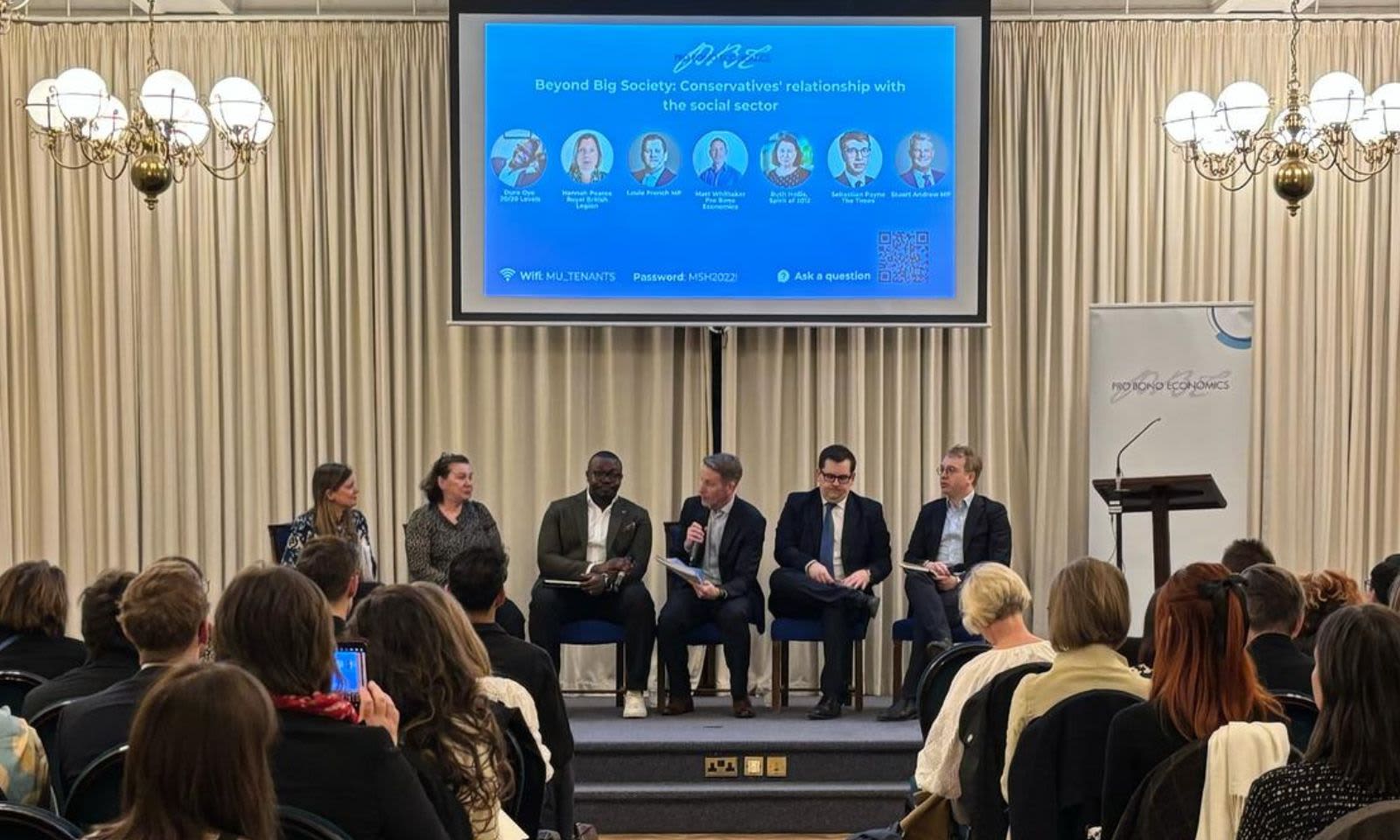The relationship between the Conservative Party and civil society has been a complex one—at times cooperative, at other times strained. But PBE’s event, Beyond Big Society: Conservative’s relationship with the Social Sector, showed that Conservative politicians are ready to do things differently.
The event set out to explore how the Conservative Party and the social sector could rethink and refresh their relationship. Given the huge political change of the past 12 months and the recent announcement of the Policy Renewal Programme, it was timely for both sides. Stuart Andrew, the Shadow Secretary of State for Culture, Media and Sport, shared that the Party was entering “listening mode” and charities were candid about their struggle with long-standing challenges, — such as insufficient funding and the rising demand for services — as well as new concerns, including the pending increase in National Insurance Contributions and the impact of local government reorganisation.
Discussion on stage and around the hall underscored what will be critical for both sides going forwards – strong and formalised engagement, harnessing the expertise of civil society, and the need for long-term, meaningful collaboration.
Strengthening and formalising relationships
One of the strongest themes emerging from the discussion was the necessity for more intentional engagement between the Conservative Party and the charity sector. Shadow Secretary of State for Culture, Media and Sport, Stuart Andrew, acknowledged that the relationship had been inconsistent, with “not enough” engagement with the sector in the past.
Panel members from civil society stressed the importance of its ability to campaign and to act as critical friends to all political parties. Pointing out that engagement with Conservative politicians has often been reliant on personal networks, making it more difficult for charities – especially smaller ones – to have their voices heard. Developing richer informal relationships and establishing more formalised routes will help to smooth over some difficulties charities have had in the past. Louie French, Shadow Minister for Sport, Gambling and Civil Society, pointed to an upcoming series of thematic, social sector roundtables that will be an important step forward for this relationship building.
The expert role of charities
Charities bring expertise that extends beyond the capabilities of government and business. It was noted that civil society holds knowledge and insights that policymakers must tap into, especially in times of economic constraint. Charities provide real-time insights, lived experience, and independent research that should inform policymaking.
The panel also explored the historic tension around charities’ right to campaign. It was acknowledged that the opinion of charities from within the Conservative Party must be rooted in respect, built on a foundation of trust and understanding. Charities, after all, are deeply embedded in their communities and often work in challenging environments—giving them a unique perspective on policy impact at the grassroots level. This expertise should not only be recognised but actively sought out by the Opposition when shaping future policies.
Creating long-term, meaningful change
A recurring challenge for civil society is financial sustainability. Funding pressures, exacerbated by short-termism in government grants and policy shifts, were raised as critical barriers to long-term impact. The Shadow Minister for Sport, Gambling and Civil Society noted that the Conservatives have a role in unlocking philanthropy and tax-efficient giving to bolster sector funding. There is clear potential here – PBE’s ‘Mission Give’ report highlighted that enhanced philanthropy advice from financial advisers could unlock an additional £2.8 billion in charitable donations annually from wealthy individuals in the UK.
Beyond funding, there is a broader question of how civil society and the Conservative Party can work together to create long-term change. Issues like loneliness, wellbeing, and local authority funding challenges are issues that require long-term, structural solutions rather than piecemeal, short-term interventions. And the work of solving these challenges is not inherently party-political.
Moving from listening to action
The discussion also touched on the Civil Society Covenant, which sets out Labour’s ambition to work ‘hand in hand’ with charities to harness their innovation, dynamism and trusted community reach. The Government has been through a listening phase of its own to develop the framework, and the formal launch is due this spring.
Charities will be eager to find out how a covenant works in practice, and whether the Government can maintain the ‘door is open’ relationship with the sector that it promised at PBE’s Labour and Civil Society Summit in January 2024.
Louie French, Shadow Minister for Sport, Gambling and Civil Society, reasoned that it was “too early to say” how critical or supportive the Conservative Party will want to be on the covenant. But a stronger relationship between Conservative politicians and charities will be an asset in shaping a constructive and helpful response when the time comes.
The Shadow Secretary of State for Culture, Media and Sport has positioned the Party as being in “listening mode”, but the real test will be in what follows. Their recently announced Policy Renewal Programme presents a chance for charities to approach with an open mind while ensuring their voices are heard. The Conservative Party, in turn, must go beyond convening discussions and take meaningful steps towards genuine collaboration.
With thanks to our event panelists:
- Duro Oye, Chief Executive and Founder, 20/20 Levels
- Hannah Pearce, Director, Campaigns, Policy and Research, Royal British Legion
- Louie French MP, Shadow Minister for Sport, Gambling and Civil Society
- Matt Whittaker, Chief Executive, Pro Bono Economics
- Ruth Hollis, Chief Executive, Spirit of 2012
- Sebastian Payne, Lead Writer and Columnist, The Times
- Stuart Andrew MP, Shadow Secretary for Culture, Media and Sport
This event was the last in a series aimed at harnessing the potential of civil society through improving collaboration with policymakers. In January 2024, PBE’s Labour and Civil Society Summit convened the then Shadow Cabinet and charity leaders to discuss their future relationship. Later in 2024, PBE’s Civil Alliance event explored the potential of a deeper relationship between civil society and the civil service.

